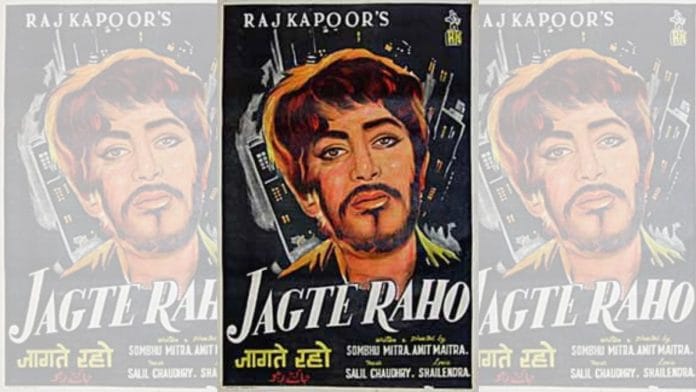A shortened version of Raj Kapoor’s Jaagte Raho won the Crystal Globe Grand Prix at the Karlovy Vary International Film Festival in Czechoslovakia in 1957. For Kapoor and his art, acquiring global acclaim in the 1950s and the 60s had become near routine.
But among the RK films’ projects that took Indian cinema to global platforms, Jaagte Raho has its own special place. With its pensive satire and near-absent dialogues for the protagonist, the film evokes the class divide in the 50s where the Socialist politics was still thriving. It forces the audiences to look within.
Few, however, would know that a particular trend was traced by the producer to make sure the film got that international attention. In her book Kapoors: The First Family of Indian Cinema, Madhu Jain writes “The fact that Pather Panchali had been given an award in Cannes was not lost on cineastes in Bombay at the time. Several directors began to believe that it was essential to make a Bengali film to get international recognition. Jagte Raho was also made in Bengali. ‘Raj Kapoor got Sombhu Mitra to direct both versions, and the Bengali version was titled Ek Din Ratre.”
The film’s choice of the subject automatically brought global appeal to it. The overseas audiences didn’t particularly need an understanding of Indian sensibilities to get to Jagte Raho’s message.
Also read: Shashi Kapoor’s New Delhi Times gives a true picture of journalism, warts and all
A classic
The dust of seven decades hasn’t made Jagte Raho irrelevant. The rich-poor divide theme is as relevant as it can get even today.
Directed by Amit Maitra and Sombhu Mitra, the film stands out as a poignant portrayal of urban life’s complexities and the inherent struggles of the common man. The black-and-white masterpiece continues to resonate with audiences even today, offering a timeless commentary on societal norms and morality.
The stark contrast between the opulence of the affluent residents and the stark poverty of the protagonist creates a palpable sense of tension that permeates throughout the narrative.
Inspired by the magic of Satyajit Ray’s Pather Panchali, Raj Kapoor may have aimed the film at a more intelligent audience but the directors made sure it turns out to be an easy watch. And the five songs come to their aid. Zindigi Khwab hai, jago Mohan pyare, ki main jhoot boliya don’t seem at all divorced from the script, and aren’t a distraction. All hallmarks of a true musical.
While its precise storytelling and stellar acting are applause worthy, the music adds a layer of hope to an otherwise bleak story. It is composed by Salil Choudhary with lyrics by Shailendra and Prem Dhawan.
Also read: Sahir’s poetry in Kabhi Kabhie and our forever connection with them
The uncivilised civilised
Jagte Raho, written by KA Abbas, unfolds over the course of a single night, following the journey of an unnamed man. Kapoor’s character, a simple villager seeking water in the city, inadvertently finds himself embroiled in a series of misadventures as he navigates through the corridors of a residential complex.
Few would know that the film’s screenplay, which spans over a night, was also written in just about 12 hours. And upon listening to the script, Raj Kapoor told Mitra, “I will direct this, you act in it.” Mitra in turn said, “let’s do the opposite.”
The man is assumed to be a thief because he was seen running in panic. While hiding in different apartments of the complex, he uncovers the hypocrisy and the uncivilised side of the so-called respectable society and its people. Not very different from the reports of violence and mistreatment of the poor and the downtrodden visible in high rises and fancy gated societies in Indian cities.
Also read: Mamta belongs to Suchitra Sen. Her range on full display—dancer, mother, fierce lover
The elusive commercial success
a film without a lead pair, zero romance, or the Hindi film masala and a purist director who belonged to the world of theatre is a perfect recipe for commercial failure in Bollywood even today. And it wasn’t different back then. Albeit Jagte Raho was close to Raj Kapoor’s heart. He once described it as one of “two special children”, who didn’t succeed.
Maybe the film got a little too real for Indians who were still high on the freedom struggle and the Independence that was not even a decade old when it hit the theatres.
Jagte Raho—stay awake—has a hopeful ending. Raju, who had come to the city, and was looking to quench his thirst, encounters Nargis who comes to his help. That was the last time Nargis and Raj Kapoor came on screen together before their romance came to an end.
This article is part of a series called Old Movie Reviews. Read all articles here.
(Edited by Anurag Chaubey)






